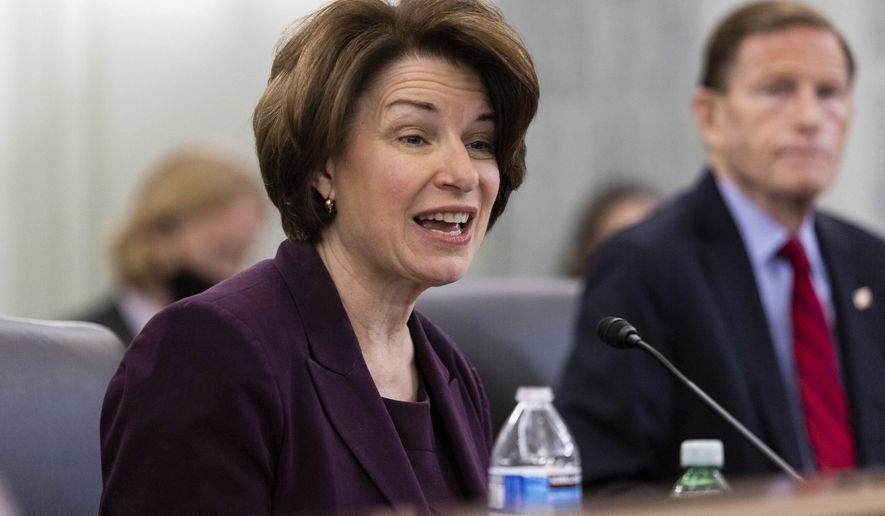Sen. Amy Klobuchar told a crowd of voting-rights activists in Washington on Tuesday that Senate Democrats are close to taking another shot at changing elections laws around the country.
“We are very close to getting a bill done where everyone in the Democratic caucus will sign on to,” Ms. Klobuchar, Minnesota Democrat, told a crowd gathered near the U.S. Capitol.
A group of about 150 Democratic state legislators from around the nation converged on the Capitol to call on the Senate to pass an election bill that would block changes in voting laws that Republican legislatures are passing around the country.
The Democratic senators, as well as the state legislators, continued to portray the state laws as racist attempts to prevent people of color from voting.
“We have got to say this loudly. These voter suppression bills are about white supremacy,” Sen. Bob Casey, Pennsylvania Democrat, told the crowd. “That’s one of the many reasons we have to stop them, or override them. The federal government cannot allow a continuation of the white supremacy that has led to so many problems for so many Americans.”
Ms. Klobuchar’s comments came less than a week after Democratic leaders huddled with President Biden on crafting a new legislative path to enact their priorities for a federal voting measure.
A possibility, said Sen. Cory A. Booker, New Jersey Democrat, is to include the new proposal as part of the $3.5 trillion human infrastructure package that Democrats are planning to push through Congress through a budget procedure called reconciliation.
The state laws, among other things, increase requirements on voters to show ID and make other changes like barring voting on Sundays, and restricting drop boxes for ballots.
Republicans say the changes are needed to prevent election cheating, and studies are mixed on the extent to which they keep people of color from voting. But Democrats say Republicans are approving the measures in the belief they will disproportionately affect people of color.
“This is really dead simple. Some people don’t want some people to vote,” Sen. Raphael Warnock, Georgia Democrat, said at the rally. “So when they should have been busy trying to suppress the virus, they were trying to suppress the vote.”
However, any Democratic push to pass a voting bill through the evenly divided Senate faces an uphill battle. Any legislation would need the support of 10 Republicans to stop a filibuster in the Senate.
In a party-line vote, all Senate Republicans in June blocked the Democrats’ For the People Act from being considered. The bill would set national standards that track with the laws in the most liberal states, including looser requirements for voters to provide ID, and requiring voting by mail.
Democrats also want to amend the federal voting-rights act so the Justice Department will more easily be able to block new state voting laws it believes harms civil rights. But that bill faces the same fate as the bill in June.
Ms. Klobuchar has floated the option of using reconciliation, which would need all 50 Senate Democrats to go along.
Mr. Booker also said in an interview that he favored using the budget procedure to pass the voting laws.
He said it was a “great way” to allow the Democratic measure to pass with only 50 votes and no Republican support.
But Sen. Jeff Merkley, Oregon Democrat, noted that the reconciliation procedure cannot be used to change policy unless there are budgetary impacts. Ms. Klobuchar has suggested creating financial incentives for states to pass voting rules that Democrats want.
Senate Minority Leader Mitch McConnell last week predicted Democrats would try to use the human infrastructure bill to pass voting measures.
“The overall price tag is so outrageous, and the potential economic damage so significant, that you can almost forget to look at all the terrible policies Democrats are hoping to hide behind the jaw-dropping dollar figure,” the Kentucky Republican said on the Senate floor. He ticked off liberal measures that he thinks Democrats will include in the measure, including, “pieces of their effort to take over all 50 states’ election laws under false pretenses.”
Democrats could also take another tact by undoing the Republicans’ ability to block the bill through a filibuster.
“I’m not sure we have a specific vehicle,” Mr. Casey said of the Democratic strategy to pursue voting changes. “We’ve got to eventually deal with this Senate rule, which is an impediment. I think we can get there.”
Advocacy groups and the state lawmakers at the rally urged the Senate not to leave for a month-long break, as they are scheduled to do on Friday, without passing a voting measure.
That appeared unlikely. But Mr. Warnock urged his colleagues to stay in Washington, even though the Senate is consumed with passing a bipartisan $1.2 trillion traditional infrastructure bill focused on such projects as building new roads, bridges and expanding the availability of broadband internet.
• Kery Murakami can be reached at kmurakami@washingtontimes.com.




Please read our comment policy before commenting.